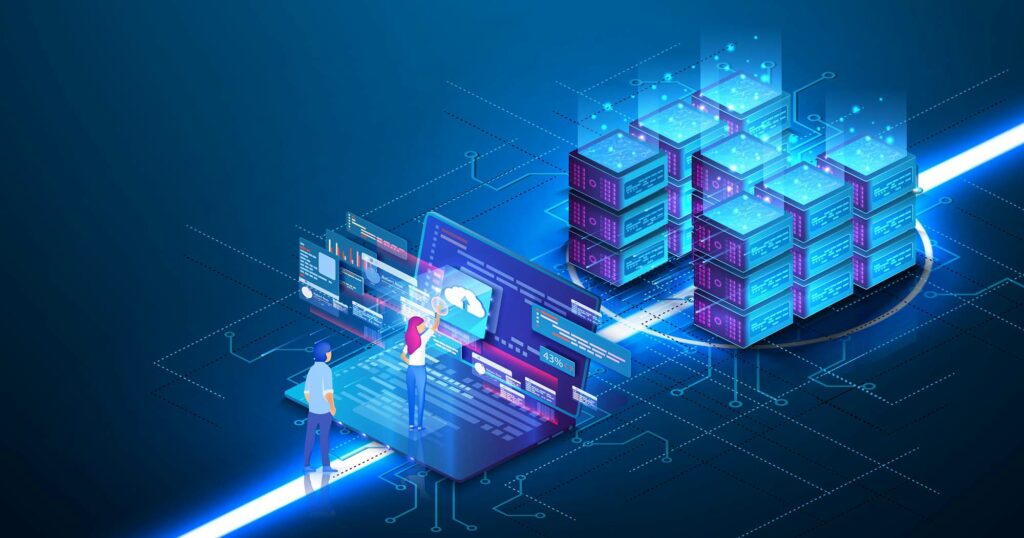The Internet of Things’ (IoT) explosive expansion has transformed industries by allowing billions of devices to connect and communicate with one another. However, latency, bandwidth, and processing power become major issues due to the massive volume of data created by IoT devices. When paired with containerization technologies like Docker, edge computing provides a potent remedy for these issues. This blog explores the advantages, use cases, and best practices of Docker as it improves edge computing for Internet of Things deployments.

Understanding Edge Computing and IoT
In order to reduce latency and increase response times, edge computing is a distributed computing paradigm that moves processing and data storage closer to the point of demand. Edge computing in the context of the Internet of Things refers to processing data locally on devices or edge servers as opposed to depending exclusively on centralized cloud data centers. With this method, latency is decreased, bandwidth is preserved, and real-time data processing and decision-making are made possible.
Why Docker for Edge Computing in IoT?
Docker’s lightweight and portable containerization technology makes it an ideal choice for edge computing in IoT deployments. Here are some key advantages:
- Portability
- Applications and their dependencies are encapsulated by Docker containers, which guarantees reliable performance in a variety of settings, including edge devices.
- Resource Efficiency
- Because Docker containers are lightweight, they are appropriate for edge devices with limited resources.
- Scalability
- Microservices designs may be deployed with Docker, which makes it possible for Internet of Things applications to grow across several edge nodes with ease.
- Ease of Deployment
- Docker simplifies the deployment, management, and orchestration of applications on edge devices, reducing operational complexity.
Key Benefits of Using Docker for Edge IoT Deployments
- Reduced Latency
- Docker containers can greatly minimize the latency involved in delivering data to centralized cloud servers for processing by processing it at the edge. This is critical for real-time Internet of Things applications where milliseconds matter, like industrial automation, driverless vehicles, and smart cities.
- Improved Reliability
- By enabling ongoing operation even in the event of a loss of connectivity to the central cloud, edge computing with Docker improves the resilience of Internet of Things systems. Edge devices can operate independently and make crucial decisions without relying on distant servers thanks to local processing.
- Bandwidth Optimization
- Massive data generated by IoT devices can overflow network bandwidth when it is sent to central servers. Docker at the edge reduces the volume of data transferred to the cloud and conserves bandwidth by enabling local data filtering, aggregation, and preprocessing.
- Enhanced Security
- The danger of data breaches during transmission is decreased when data is processed locally on edge devices. Applications are guaranteed to operate in secure containers because to Docker’s isolation capabilities, which reduce attack surfaces and improve system security overall.
Use Cases of Docker in Edge IoT Deployments
- Smart Cities
- IoT devices are used in smart cities to monitor and control infrastructure, including waste management systems, traffic lights, and streetlights. Real-time data processing is made possible by Docker containers running on edge devices. This enables quick reactions to changes in the environment, traffic patterns, or power outages.
- Industrial Automation
- The goal of industrial IoT (IIoT) is to optimize production processes by integrating sensors and machinery. Docker at the edge enhances operational efficiency and decreases downtime by enabling real-time machine performance monitoring and analysis, predictive maintenance, and anomaly detection.
- Healthcare
- IoT devices are used in the healthcare industry to gather vital patient data, including blood pressure, glucose levels, and heart rate. Healthcare professionals can receive instant alerts and timely interventions by using Docker containers on edge devices to process and analyze data in real-time.
- Retail
- Retail IoT devices are used by retailers for customized shopping experiences, inventory management, and customer behavior analysis. Real-time data analysis and decision-making are made easier by edge computing with Docker, which improves operational effectiveness and customer service.
Best Practices for Deploying Docker in Edge IoT Environments
- Optimize Container Images
- Make that Docker container images are optimized for edge devices with limited resources. To reduce image size and include just necessary dependencies, use multi-stage builds.
- Implement Robust Security Measures
- Use Docker Content Trust for image signing, operate containers with the least amount of privilege, and update images frequently to fix vulnerabilities to ensure that Docker containers are secure.
- Automate Deployment and Management
- For the purpose of automating the deployment, scaling, and management of Docker containers across edge devices, utilize container orchestration tools like Kubernetes or Docker Swarm. This streamlines processes and guarantees consistency.
- Monitor and Manage Performance
- Use monitoring tools to keep tabs on the functionality and condition of Docker containers running on edge devices. To enable proactive management and optimization, gather and visualize metrics using tools such as Prometheus and Grafana.
- Ensure Resilience and Fault Tolerance
- When designing IoT applications, consider fault tolerance and resilience. To guarantee ongoing operation in the event of hardware malfunctions or network interruptions, use redundant edge nodes and have failover measures in place.
Conclusion
Edge computing in Internet of Things deployments is being revolutionized by Docker’s containerization technology, which offers major advantages in terms of lower latency, increased dependability, bandwidth optimization, and greater security. Organizations can fully utilize IoT applications and enable real-time decision-making by utilizing Docker to handle and analyze data at the edge.
The way that edge computing and Docker are integrated will be critical to the future of many industries, including retail, healthcare, and industrial automation as well as smart cities. Organizations may keep ahead of the quickly evolving technical landscape, spurring innovation and attaining operational excellence in their IoT installations, by adhering to best practices and leveraging Docker’s benefits.
